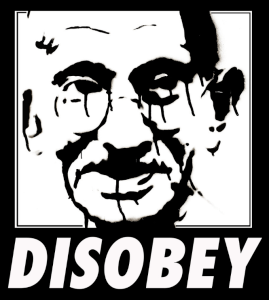
Mindfulness
Transforming the Social Order Through Personal Practice? (2)
Part 2: The case of nonviolent communication.
Posted April 27, 2020
In September of last year, I posted Part One of this piece in response to an article questioning the potential of personal practices like mindfulness to transform, or even challenge, the existing social and economic structures of our social world. In it, I explored deep questions I have about why and how Nonviolent Communication (NVC), despite its radical roots, has, for many, become associated with far narrower goals than Marshall Rosenberg envisioned when he developed and began sharing the practice. In my eyes, his big vision of social change appears to have been reduced to a theory of change that implies that just individual practice, writ large, will be sufficient for social transformation, without clear ideas or pathways for systemic change.

I am one of many people who, having been exposed to the simplicity, elegance, and practicality of NVC, desire to unleash its potential in ways that transcend the limitations of a purely individual or interpersonal practice. In fact, this desire may well be a summary of all I aim to do in my life. In this piece and those that follow it, I engage with the fundamental question of how those of us who are NVC practitioners, especially those of us who are committed to sharing NVC with others, can more closely align with and expand on what I understand to be the legacy of Marshall’s work at the social level.
This exploration takes me into three areas:
- In thinking about how NVC is shared with others: What can we do to increase systemic awareness when we engage with individuals, groups, and organizations in support of their learning and applying NVC? It’s only with such awareness, which I can clearly see as far back as in Marshall Rosenberg’s earliest writings, that those who are committed to deep transformation can create sufficient support structures to withstand the deeply ingrained and internalized individual and collective habits of either/or and right/wrong thinking and processes, as well as the separation, competition, and scarcity that are baked into all of us.
- When taking our work outside of the workshop and consulting setting, where money usually exchanges hands: How do we contribute with our bodies and souls to embedding these practices within the communities we form and live within? Such communities are indispensable to the possibility of inner and outer transformation, in that the collective capacity to shift out of societal patterns when we have webs of support, feedback, and agreements that align with our values far exceeds what we can ever do without that resonance.
- As some of us are invited to re-embed NVC within the larger field of applied nonviolence out of which it arose: How do we branch out beyond interpersonal dialogue as the only method for creating change? Especially in times of growing global crisis, nonviolent responses become ever more imperative, and NVC can have a profound contribution in this field once we recognize what we truly and uniquely have to offer: principles such as care for the whole, including those whose actions are harmful, putting vision and needs front and center, and aiming for solutions that work for everyone and the concrete practices that emerge from them.
Because of the scope of these questions, I plan to approach them one by one to uncover and explore in full what each of them invites us to grapple with. Like the work of transformation itself, it will not happen overnight, but through a commitment to revisiting these places in our personal and collective conditioning with discernment, compassion, and willingness to be courageous and vulnerable in our work of seeding nonviolence in our world. The questions I present to you are ones that I am grappling with in my own life, and I share them with you as part of my own practice of transparency and humility.

